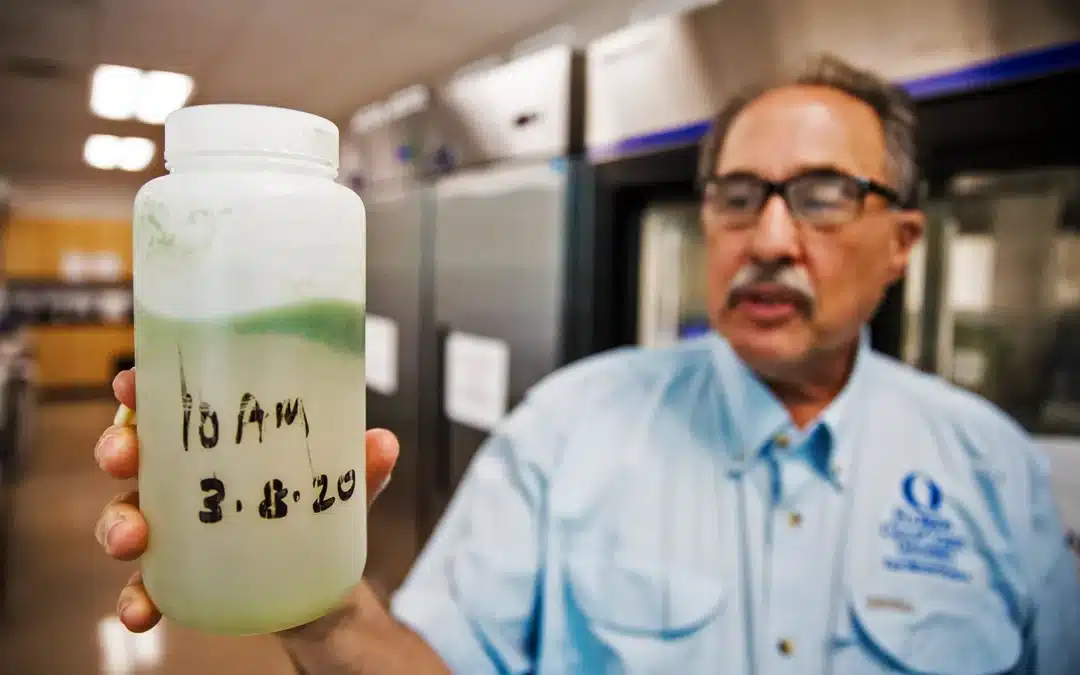A Caloosahatchee River water advocate says a Florida Gulf Coast University professor is endangering public health by downplaying the ongoing blue-green algae outbreak in Lake Okeechobee and the river.
When asked, Jason Pim said on Facebook that FGCU professor and researcher Barry Rosen was endangering public health due to comments made in The News-Press and other local media.
Pim was replying to a News-Press reporter post on Facebook that highlighted Rosen and his thoughts on this summer and the state of blue-green algae in Lake Okeechobee and the Caloosahatchee River.
He said using words like “relative” to compare algae conditions year-to-year can put the public at risk.
Pim says Rosen, who’s been studying the lake for more than 30 years, is giving the false impression that freshwater systems here aren’t all that dangerous to the public this summer.
Toxins have been found this summer in Lake Okeechobee and the Caloosahatchee River, and the Florida Department of Health in Lee County has issued public advisories about the toxic conditions.
Pim is also secretary of Calusa Waterkeeper, although he said on Facebook that he was not speaking for the organization when he made those comments and suggestions.
Rosen, however, is a world-renowned algae expert, and government agencies from the United States and foreign countries use him to identify unknown algae species during damaging blooms.
“Am I saying cyanobacteria isn’t harmful? No,” Rosen said. “But there is no big bloom on the lake.”
Some national media have published stories that give the impression this year is a bad one for blue-green algae in the historic Everglades system.
Rosen said, compared to recent years, this year is pretty average, that there is no monster bloom looming on Okeechobee or in the Caloosahatchee River.
What about the other suggestions, that he is for some reason downplaying the current algae situation in the lake and river?
“If you’re an advocacy group, you’re trying to scare people to raise money and grow membership, and that’s a problem,” Rosen said. “Where is the human health impact they’re talking about? Are they just pulling water out of the river and drinking it raw?”
Rosen was a program manager and supervisor for the South Florida Water Management District in the 1990s, where he worked with blooms and the regulation schedule for Lake Okeechobee ‒and he’s studied conditions in the lake since.
He has an extensive collection of algae that he grows in his lab, and Rosen is a key researcher at FGCU’s Water School.
Calusa Waterkeeper rose to prominence during the epic blue-green algae bloom of 2018, which caused some people to flee their homes and temporarily wrecked the local housing, short-term rental and fishing guide industries.
Then Calusa Waterkeeper John Cassani, who has an extensive background in local water quality science, was quoted in various national and local media and helped grow the group’s name and membership.
Cassani retired earlier this year and was replaced by local fishing guide Codty Pierce, who was unavailable for comment Monday or Tuesday.
Rosen said he’s more than happy to work with any local group, and that he examines water samples from various sources on a regular basis.
“I take samples from anyone, and people bring me something that floated off the bottom and say there’s a blue-green algae bloom,” Rosen said. “Just don’t drink it or let your dog get in it or drink it. And show me a single report of a blue-green algae death. That’s almost impossible. Cyano-intoxication is extremely rare.”
The U.S. National Office for Harmful Algal Blooms says cyanobacteria in drinking water can cause health issues, and that contact with tainted waters can cause a variety of health issues.
“The presence of high levels of cyanotoxins in drinking water can cause gastrointestinal complications, liver damage, neurological symptoms, and potentially even death, and (they) have been linked to deaths of both wild and domesticated animals, including multiple dog deaths,” says the center’s website. “Recreational exposure to toxic (cyanobacteria) via direct skin contact, inhalation, or inadvertent ingestion of water can cause a broad range of medical issues for people working or recreating on the water.”
Several agencies and universities are working on studies and research in hopes of better determining human impacts from exposure to blue-green algae.
“The long-term health effects of being exposed to cyanobacteria or their toxins in people and animals remain unclear,” a Center for Disease Control and Prevention website reads. “Because we are still learning about the long-term health effects, it’s important to take steps to keep yourself and your pets safe, such as not going into water containing large amounts of cyanobacteria or high levels of cyanotoxins.”
Read Story on News-Press.com

























